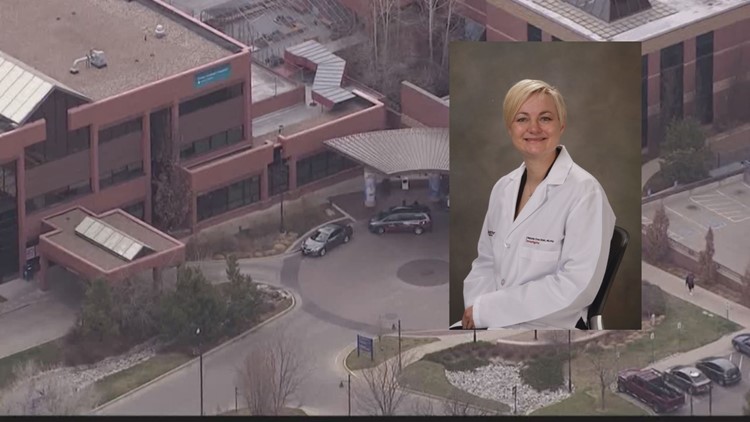DENVER — A Denver doctor who nearly lost her life to a surgical site infection in 2016 sued Porter Adventist Hospital and its owner Centura Health on Wednesday, alleging the hospital “placed corporate profits above responsibility.”
Dr. Melanie Green’s lawsuit, filed in Denver District Court, claims the hospital continued performing surgeries despite knowing the facility “had a history of problems with sanitizing equipment [and] high rates of surgical site infections.”
Dr. Green, a pediatric endocrinologist at the CU School of Medicine, told 9Wants to Know the serious complications she suffered after her surgery at Porter were the direct result of “an infection that was 100 percent preventable.”
Porter’s problem with unsanitary surgical equipment became public in April when the hospital started notifying thousands of former patients they were at low risk for hepatitis, HIV and surgical site infections.
The hospital sent 5,800 letters to patients who underwent orthopedic and spine surgeries between July 21, 2016, and April 5, 2018.
Dr. Green’s lawsuit represents the first legal move by a patient who became ill due to an infection.
While Porter has yet to respond to the lawsuit, federal and state officials have recently turned their attention away from the hospital under the impression the hospital has adequately addressed its past problems with dirty surgical equipment.
Dr. Green went to Porter for a hip reconstruction surgery July 25, 2016. She left the next day.
The infection on her right hip developed not long after. While at home, she and her husband – a doctor himself – used a black marker to trace the extent of the redness on her right hipbefore going to sleep one night.
By midmorning, Dr. Green knew the infection was getting worse because she could see the redness had gone well beyond the black lines.
Less than two weeks later, while hospitalized for what had become a serious infection at St. Joseph Hospital, she developed, according to the lawsuit, “hallucinations” and “respiratory distress” that “required life-saving resuscitation by health care providers.”
For Dr. Green, it was like living out a scene of a horror movie.
RELATED | After man in need of kidney found donor, Porter Hospital unexpectedly halts transplant program
“I remember all of it,” Dr. Green told 9Wants to Know.
Conscious for most of the medical procedures, Dr. Green said she felt as if she was watching herself die.
“It was absolutely awful,” she said. “We all go through things in our life. This, by far, has been the toughest thing that I have ever been through.”
Within a few days, she started to slowly recover. She and her husband initially chalked the infection up to bad luck.
Bad things happen in medicine, even today, they thought.
“Stuff happens,” she said. “We said, we’ve got to figure out how to move on.”
She notified Porter of the infection and then tried to do just that.
Less than two years later, Porter’s unsanitary surgical equipment problem became national news. Dr. Green read about it on cnn.com.
The story informed her that her surgery date was within the infection-risk window put forward by Porter.
She and her attorney no longer believe the potentially deadly infection was a medical coincidence.
“Porter was playing Russian roulette with their patients’ safety, and they didn’t care about it,” said Green’s attorney Hollynd Hoskins.
The lawsuit outlines a series of alleged missteps by the hospital that came as a result of staff trying to do more and more surgeries at a time when staffing levels couldn’t keep up with the demand.
“Porter Adventist did not increase staffing or improve efficiency to meet this increased demand,” the lawsuit states.
As a result, between February 2017 and February 2018, the hospital experienced at least 129 “known occurrences” of dirty surgical instruments making their way close or into the hospital’s operating rooms.
“They’re having instruments come into the ORs with visible bone, blood, bugs, hair and residue,” Hoskins said.
“Porter continued scheduling a high volume or surgical cases, despite knowledge of overburdened and ineffective pre-cleaning and surgical processing procedures,” according to the lawsuit.
At the same time, state and federal inspection reports indicate Porter staff misrepresented to the Centers for Disease Control the number of patients who had experienced surgical site infections after undergoing procedures inside the hospital.
For example, federal investigators concluded earlier this year Porter had only self-reported three of the eight total patients who had qualifying surgical site infections to the CDC’s National Healthcare Safety Network.
Dr. Green said the underreporting allowed the hospital to give potential patients a misleading impression the hospital was performing well.
“They’re reporting less than 50 percent of their known infections, so of course they have the lowest rate of infection in Denver,” she said.
According to an internal email obtained by 9Wants to Know through a federal open records request, in March of this year, a physician with CDC informed the Colorado Department of Public Health and Environment (CDPHE) that Porter “has a widespread pattern of inadequate cleaning of surgical instruments prior to sterilization and hasn’t demonstrated proactive measures to improve the long-standing deficient processes.”
Porter, along with its parent company Centura Health, has continually declined requests from 9Wants to Know for an on-camera interview.
Instead, a spokesperson for Centura provided 9Wants to Know with a series of written statements outlining the hospital’s position.
In June, Porter’s spokesperson Chrissy Nicholson wrote in an email, “At Porter Adventist Hospital, patient safety remains our number one concern and we are working collaboratively with CDPHE to ensure best practices at our hospital. Any process decisions, including those for cleaning instruments, are based on quality and patient safety.”
In July, following an investigation by state and federal health investigators, the Centers for Medicare and Medicaid Services concluded Porter had largely corrected its past problems with equipment sterilization as it “determined that Centura Health-Porter Adventist Hospital is in compliance with all of the Conditions of Participation for Hospitals.”
In August, CDPHE announced it had placed a year-long condition on Porter’s license that requires Porter staff to provide additional reports to CDPHE “on the performance of its sterilization of surgical instruments.”



